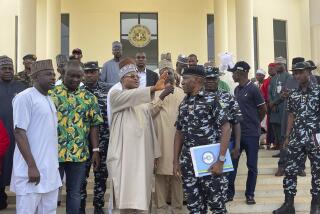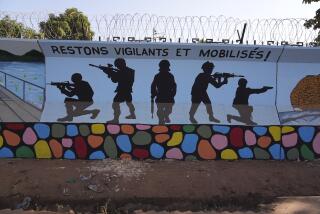Abducted Nigerian girls put terrorist group on world map

Nigerian President Goodluck Jonathan believes the more than 270 schoolgirls kidnapped by Islamist militants are still in the country.
The mass abduction of several hundred schoolgirls sparked outrage. But it was the rambling, hourlong Hausa-language video by the terrorist group’s leader that triggered a global uproar.
In it, Boko Haram chief Abubakar Shekau threatened to sell the teenage girls “into the marketplace” as slaves, or force them to marry by age 12.
Suddenly a 5-year-old violent insurgency that has threatened the stability of sub-Saharan Africa’s most populous nation and its largest economy has drawn condemnations at the United Nations, demands for action in the U.S. Congress, protests in capitals around the globe, and a viral Twitter campaign from Nigeria.
The unusual case has cast a spotlight on the Obama administration’s attempts to help African governments struggling against homegrown terrorist groups, including the Shabab in Somalia and Kenya, Al Qaeda in the Islamic Maghreb in Mali and Algeria, and the Lord’s Resistance Army in Uganda and Sudan.
The Pentagon has quietly stepped up assistance across the region, especially for counter-terrorism missions.
Nigeria’s Boko Haram, a Taliban-styled group, is arguably the least-known threat, but it is just as vicious. Nigerian police offered a $300,000 reward Wednesday for information leading to the rescue of 276 girls who were abducted April 14 from their government-run school in Chibok by Boko Haram gunmen, who drove off with them into the jungle.
The group subsequently kidnapped other girls to prevent them from attending school, which Boko Haram says violates Islamic law. The total number now missing is unclear.
U.S. officials believe some of the girls may have been taken into remote regions of neighboring Cameroon, Chad or Niger.
Their plight now is a global cause celebre, driven in part by social media. First Lady Michelle Obama tweeted a picture of herself Wednesday holding a sign hashtagged “BringBackOurGirls,” saying her prayers were “with the missing Nigerian girls and their families.”
She signed it with her initials, which she uses to indicate that she, not her staff, wrote the tweet.
Across town, House Speaker John A. Boehner (R-Ohio) joined in by tweeting #BringBackOurGirls.
Even as the U.S., French and British governments offered this week to help Nigerian authorities find the girls and capture the kidnappers, the bloodshed worsened. Heavily armed militants allegedly from Boko Haram killed about 300 civilians and set fire to houses and shops Monday in rural Gamboru Ngala in the northern state of Borno, according to local officials.
The violence and abductions are overshadowing an Africa-wide economic conference in Abuja, the Nigerian capital, that was supposed to showcase the oil-rich country’s progress.
A local Christian group released the names of some of the girls who are missing, provoking anger because the names of Muslim girls weren’t on the list, titled, “Daughters of Zion Taken Captive, to Be Treated as Slaves and Sold Into Marriage to Unclean People.”
The sudden swell of outrage from the international community appeared to push President Goodluck Jonathan’s government to appease parents who have staged street protests as the crisis has dragged on. Nigeria’s defense spokesperson agreed to meet with the leaders of about 500 protesters who marched through the capital.
In Washington, U.S. diplomats scrambled to get a team of military, law enforcement and intelligence specialists to Abuja. The U.S. ambassador, James F. Entwistle, met with Nigeria’s national security advisor, Sambo Dasuki, and the embassy’s legal attache was in touch with local law enforcement.
“We remain committed to doing everything we can to help the Nigerians find and free these girls and help them return safely home,” said Jonathan Lalley, spokesman for the National Security Council.
Jen Psaki, the State Department spokeswoman, said the U.S. operation would begin “in days, not weeks.” She said the FBI was ready to send additional personnel to provide technical and investigatory help to the Nigerians, including experts on hostage negotiations.
The Pentagon’s Africa Command, based in Stuttgart, Germany, also mobilized a team to assess Nigeria’s needs. The command previously helped the Nigerian army set up a special operations base to fight Boko Haram, and it flies surveillance drones from neighboring Niger.
“There are a whole range of things that we can do and are doing,” White House Deputy Press Secretary Josh Earnest said Wednesday. “If there is additional assistance that can be provided, we will provide it.”
The case was immediately taken up by partisans in Congress. Sen. Dianne Feinstein (D-San Francisco), who chairs the Senate Intelligence Committee, applauded the Obama administration’s actions and said she supported sharing whatever U.S. intelligence was necessary “to bring these kidnappers to justice.”
“Terrorist groups like Boko Haram and Al Qaeda in the Islamic Maghreb have been gaining strength, and we must not allow a safe haven to develop from which these groups can grow, plan and launch attacks,” she said.
House Republicans on the Homeland Security Committee questioned whether the administration was quick enough in taking the threat seriously. GOP lawmakers held hearings on Boko Haram in 2011, identifying the group as an “emerging threat to the U.S. homeland.”
The State Department listed the group as a foreign terrorist group last November. The designation said Boko Haram had links to Al Qaeda in the Islamic Maghreb and was responsible for thousands of deaths, including targeted killings of civilians, in northeastern and central Nigeria.
Rep. Patrick Meehan (R-Pa.), who chairs the House subcommittee on counter-terrorism and intelligence, said that if the administration had listed Boko Haram as a terrorist organization earlier, U.S. authorities now would have had better intelligence on which to draw. He also said the dispatch of advisors was “a little too little too late.”
Rep. Ed Royce (R-Fullerton), who chairs the House Foreign Affairs Committee, said he would convene a hearing to examine the administration’s response to the crisis. Royce said the U.S. needed a “strategic, multifaceted approach to help Nigeria combat Boko Haram.”
“It is clear that a piecemeal approach to Boko Haram, with limited U.S. military involvement, has been ineffective to date,” he said.
Parsons reported from Washington and Dixon from Johannesburg, South Africa.
More to Read
Start your day right
Sign up for Essential California for news, features and recommendations from the L.A. Times and beyond in your inbox six days a week.
You may occasionally receive promotional content from the Los Angeles Times.







